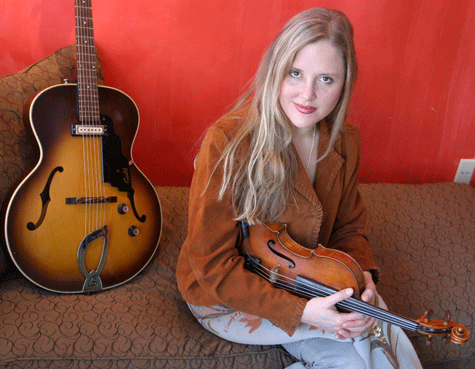

This is Page 2 of the Online Edition of the 2007-2008 Harvey Reid Newsletter...
Go to Page 1 of this Newsletter Read old Newsletters
 |
Yours truly in the summer of 1976 at a bluegrass festival in Virginia, playing with the "Valley View Hog Roast & Squirrel Gravy String Band." I'm getting younger looking, huh? |  |
|
I have kept a mailing list for over 20 years, and I swear it is getting harder and messier than ever to keep up.
We now have to keep both e-mail and snail-mail lists, and when you people move, the last thing you want to do is
notify some musician like me, so either you switch e-mail providers or you move to a new address, and some of you
keep the same e-mail or the same address, and I am left with a dwindling list of names that are partially correct.
All I want to do is send you a postcard or an e-mail a couple times a year, and one newsletter, and you would think
it would be simpler. |
|
On April 8 the Washington Post ran a long feature
article by Gene Weingarten called "Pearls Before Breakfast" in
the Sunday magazine. Rarely have I been more intrigued with a story, and it is one that I think musicians will
be talking about for years to come. In case you missed it, it's worth passing on. |
All of us suffer setbacks along the way, but I came across a remarkable review that Peter Tchaikovsky got in 1881 for his brand new Violin Concerto, now pretty universally considered one of the greatest works ever written for the instrument. Vienna music critic Eduard Hanslick wrote:
|
|
This review comes from ANDY ELLIS (Guitar Player Magazine)
|
“A timeless collection of sounds and images, it’s destined to become a classic in the folk and acoustic
music world. The level of creativity embodied within the book is simply astonishing. With its beautifully recorded
songs, historic photos, insightful essays, and cool guitar instruction, The
Song Train offers a deeply satisfying
experience for the ears, eyes, and imagination. And, of course, the music on the four discs is outstanding. Harvey
and Joyce have a magic touch, a way of making both traditional and contemporary music come alive. |
| |
|
|
NEWSLETTER ESSAY
|
|
|
About the only news there seems to be this year in the media
is about the continuing death spiral of the music business, and how it is being replaced by digital downloads.
Of course, just like everything I have seen on this subject, only a few points of view get represented, and mine
never seems to be the prevailing opinion. When Napster blew up as a cultural phenomenon, it became a battle between
college students swapping files, and big record companies and rock stars getting mad. Very few of my fans are
college students, and the business world I live in barely resembles that of Madonna or The Rolling Stones. So
here is my current analysis of the supposed "crisis" from my
vantage point. |
your only outlets for "getting the word out" other
than direct mail. If people heard a song on the radio, they had to write the radio station a letter or make
a phone call to find out the artist and album name, then try to locate the source of the recording and write
them a letter and wait weeks for a catalog to be mailed so they could send a money order to buy it and wait
for more weeks. Or they went to a record store, and the record store did all that legwork. It was so slow and
so hard. |
|
 |

My wife & music partner Joyce Andersen did a lot of gigs this year with her band, some tours with me, plus some solo concert gigs. She has turned into a formidable rock & roll singer and bandleader, but I am still hoping we can keep her in the acoustic music world. She may make a fiddle album, and is looking for music and collaborators for some musical projects of her own. We will probably take a break from duo recordings after doing 3 in a row, and with the last one being so big. (see front page about the Song Train...)
|
See Page 1 of this Newsletter Read old Newsletters
This web site
concerns the music and life of acoustic musician, writer & music educator Harvey Reid.
If
you don't find what you want, or if you have comments or questions, please email
to ![]()